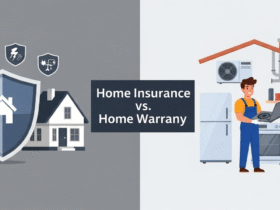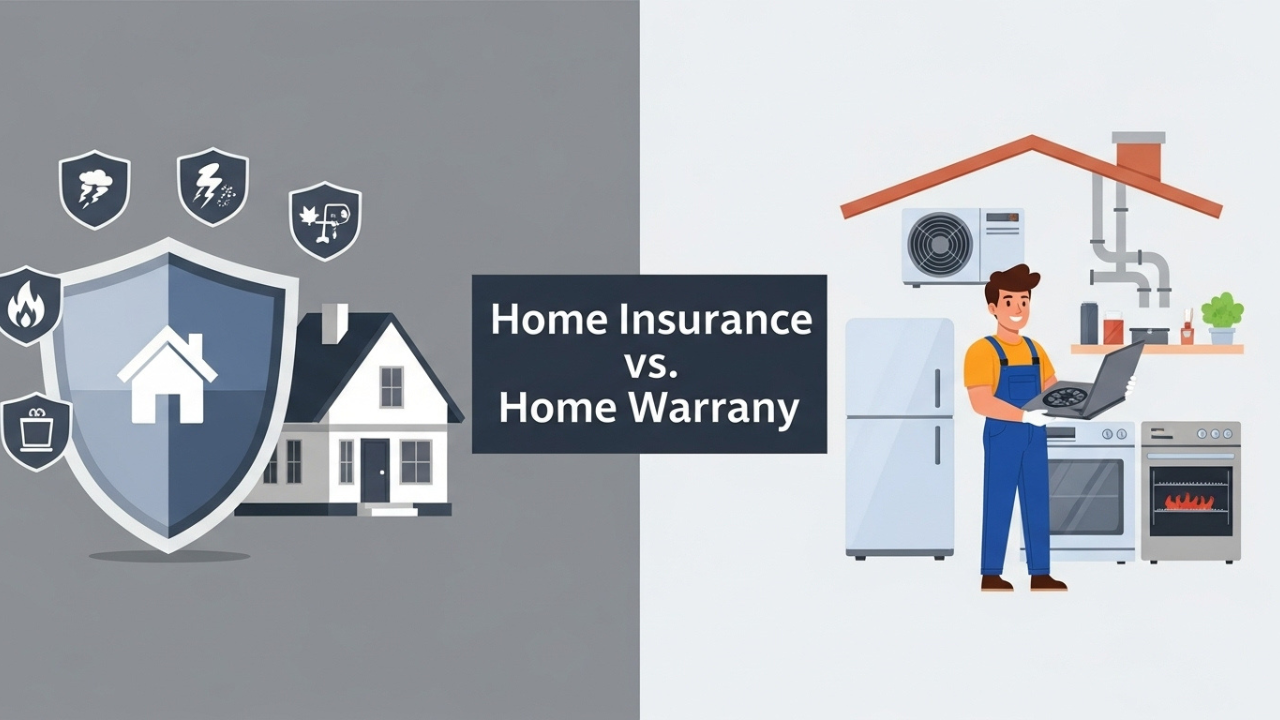As a potential or current homeowner, you may have come across ‘home insurance’ and ‘home warranty.’ Stereotypically, they both seem like products that would protect your house, but shortly after you look at them in more detail, you realize that they have very different functions. I recollect when purchasing my first home, I was completely puzzled, thinking home insurance paid for everything including the appliances in my house. That was by no means the reality.
This is what we need to straighten out: home insurance and home warranty are not the same policies. Differently from each other, they won’t be the same required paperwork, have the same clauses, or aid you in the same situations.
In this guide, I’ll cover all the relevant information. If as a homeowner your goal is to cover your house without the chances of unnecessary loss, this will be beneficial.
Key Takeaways
- Home insurance manages loss from fire, storm damage, and theft, whereas home warranties will cover appliances and other systems that age with time and must eventually be replaced.
- A mortgage will require home insurance while a home warranty will not be required.
- Home insurance will not cover a broken water heater, but a home warranty will.
- The processes of making claims for each type of insurance differ quite significantly. The claims process for insurance companies is often longer, whereas warranty claims are typically faster, but more restrictive.
Understanding these differences saves you surprise expenses and aids in selecting the most appropriate coverage.
What Is Home Insurance?
Let’s cover the fundamentals. Homeowners insurance, or simply home insurance, is a form of coverage that provides a homeowner with protection against various risks. Such risks are fires, severe storms, theft, and some water damage. If a loss occurs suddenly and unexpectedly, repairs or replacement of the damaged property can be insured.
A good policy often includes:
- Coverage for the house structure (also referred to as dwelling coverage)
- Coverage for personal property, such as furniture, clothing, and electronics
- Liability insurance for injuries sustained on the premises
- Insurance for temporary accommodation in case the insured premises cannot be occupied due to damage
Most mortgage lenders will require a certain level of home insurance. This means that if you are purchasing a house through a mortgage, there are terms and conditions relating to the insurance that you will have to fulfill before settlement.
However, home insurance does not cover maintenance costs, and therefore, will not cover a fridge or HVAC system that fails after years of use.
What Is a Home Warranty?
Now, in this section, we will discuss home warranties—they are quite different from home insurance. A home warranty is not an insurance policy; it is a service agreement. It helps cover the repair or replacement of household systems and appliances damaged due to normal wear and tear.
Here’s what household warranties usually include as far as covered items:
- HVAC systems
- Laundry centers, dishwashers, ovens, and food refrigeration units
- Electrical and plumbing systems
- Washing machines and dryers
To obtain a house, there is no need for a warranty, and no lender in the market will ever require one. But most homeowners opt for such peace of mind—especially in cases where they have older appliances or when they are purchasing a house with older systems.
Most of the time, the home warranty company will send someone from their network. Once you pay a small fee, the company takes care of the expenses of replacement or repair as long as the costs are within the plan limits.
How Home Insurance and Home Warranties Differ in What They Cover
This is one of the most important differences. Imagine, for example, a tree uproots itself and falls on your roof because of a strong wind during a storm. The home insurance would cover the repair of the unexpected damage, and thus, pays for covering repairs.
But now picture this: your air conditioner stops functioning because it’s a relic at 12 years old. That counts as wear and tear, so your warranty would take care of it—if that’s part of your plan.
Home insurance covers significant damages like vandalism, fires, storms, or anything else that occurs mostly beyond your control.
A home warranty doesn’t focus much on catastrophic events; rather, it secures the homeowner’s finances against mounding repair invoices. These typically include busted water heaters, leaking dishwashers, and defective electrical panels.
Cost Differences Between Home Insurance and Home Warranty
Home Insurance Costs
The region where you live, the coverage options you select, the size of your deductible, and your home’s value will together determine the pricing of home insurance. Homeowners in the U.S. spend around 1200to1500 yearly, with some averaging just a bit higher than that.
Depending on your arrangement, you might pay this monthly bundled with your mortgage in case an escrow account is set up, or directly to the insurance company two times a year.
Home Warranty Costs
Warranties cost less than insurance policies. As an example, a basic plan can go from 350to700 a year depending on the coverage, and if extras such as a pool or a second fridge are added.
Additionally, every service comes at a fee which is often around misplaced 75to125.
While warranties seem to be affordable options, these add up if there are walk-in service requests throughout the year.
The Claims Process: What Happens When Something Breaks or Gets Damaged
Home Insurance Claims
Consider your roof is damaged during a storm and you want to file a claim with your insurance company. Most likely, an adjuster will be dispatched to check the damage. After assessing the damage, a payment based on the coverage and deductible will be decided after the insured amount is deducted.
You will be provided funds to hire contractors to fix the damage after all the calculations are done.
Dependent on the severity of the issue, the complexity of the damage, and the speed of the payer, this can take several days or even weeks.
Home Warranty Claims
Consider the scenario in which your dishwasher ceases to drain as it normally does. In this case, you would contact your warranty provider and submit a service request online. As with most home warranty companies, they will dispatch a local technician to your house within a few days. Once he comes, you pay the service fee, and assuming the issue is within coverage limit, he either fixes the appliance or suggests a replacement.
Although warranty claims are generally more expedient, circumventing critical delays, these claims are far more susceptible to denial due to the fine print—improper maintenance, pre-existing appliance conditions, and so on.
Legal Requirements: Do You Need Both?
If you are securing a home with a mortgage, you’re going to need home insurance. This is simply to safeguard the property throughout the duration of the loan.
Home warranties, however, are optional. You can purchase a home without a warranty, and many homeowners do not have them at all. Nonetheless, some sellers provide a home warranty as part of the sale to enhance the appeal of the offer.
Similar to other insurance policies, home insurance policies provide liability protection which covers legal expenses for injuries sustained on the insured property. A home warranty does not provide this.
Coverage Limitations and Exclusions
What Home Insurance Doesn’t Cover
The insurance does have limitations, however. Most policies will not cover:
- Damage caused by floods (you will need a separate policy for this)
- Damages caused by earthquakes
- Normal deterioration of the policy
- Failure of maintenance protocols
- Damage caused by mold or pests
You may need to add additional coverage (known as riders) for specifics like jewelry or artwork.
What Home Warranties Don’t Cover
Home warranties come with many limitations. Most recognizable exclusions are:
- Previously existing concerns.
- Incorrect setup.
- Cosmetic flaws.
- Contract items exclusion.
- Commercial grade devices.
Furthermore, if an appliance fails because of negligence in servicing, the warranty provider has the right to reject the claim. It is thus crucial to read the contract in detail.
Do You Need Both? Or Just One?
That brings us to the essential question: Does a home insurance policy need to be coupled with a home warranty?
Insuring the property is mandatory when purchasing a house using a loan.
If the house is older, or if appliances and systems are aging, a home warranty provides relief. If systems are new or under manufacturer warranty, a home warranty is usually an unnecessary added expense.
I had both in the past, and it seemed like a good balance to me. The insurance was helpful for more serious problems, and the warranty made day-to-day inconveniences easier to deal with. Ultimately, it comes down to personal expectations, financial priorities, and risk appetite.
My Opinion| Making a Smart Choice
Knowing the differences between home insurance and a home warranty is not just useful—it’s crucial. Both of them are designed to assist with protecting your home, albeit in different ways.
- If you need coverage for damages incurred from fire, storms, or liability, home insurance is specialized to cater to those needs.
- Home warranties will cover gaps relating to helping with repairs when your AC unit stops functioning or your washing machine breaks down.
- Solely wishing to eliminate all worries? Both home insurance and warranties will provide you with dual coverage, as long as your budget permits.
Before making such a decision, examine your home alongside appliances, then your budget as well. Determine the amount of risk you can take. That will aid in pointing you toward the right answer.
Still have doubts? It is best to start with the current insurance policy that you have and then look for home warranty providers. This way, you will know if the coverage aligns with your needs.




























Leave a Reply